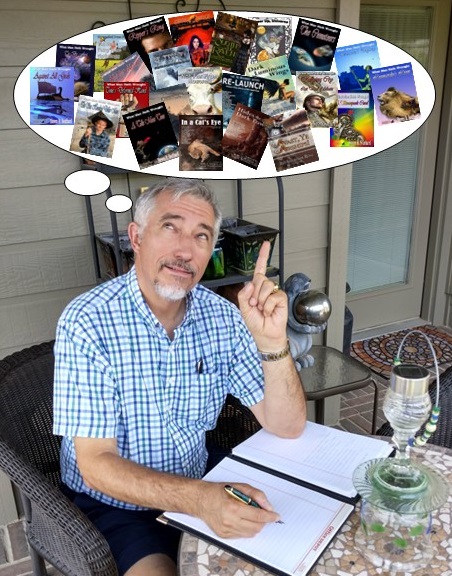Earlier this month, I had the honor of being interviewed by author Scott Edelman (Wikipedia page here).
We’d met a few years ago at Balticon, the Baltimore Science Fiction convention, and served on a couple of discussion panels together. For several years now, he’s been interviewing scifi authors for a podcast series he calls ‘Eating the Fantastic.’
While attending cons, Scott enjoyed eating meals with other authors and discussing science fiction. He soon realized he didn’t need to wait for cons to do that, so started his unique podcast series and has interviewed over 170 authors so far.
We met at the Bonnie Blue Southern Market and Bakery in Winchester, Virginia on May 3rd. A nice day, so we ate outside at one of their patio tables. After conducting so many of these interviews, Scott knew just how to make me feel at ease, and I forgot about the microphone and just answered his questions the best I could.
Most authors enjoy talking about their writing, and I’m no different. Ask any author that, and you’ll see. Before you do, though, clear your schedule for the next few hours.
My conversation with Scott ranged over many topics, and I struggled for answers at times, but overall, he’s a wonderful interviewer. My breakfast at Bonnie Blue tasted delicious. The restaurant staff provided professional and friendly service.
As you listen to the podcast, you’ll hear my views on:
- the pandemic’s effect on writing;
- SciFi conventions, including my experiences as panelist and moderator;
- how I started writing;
- my early influences, including Verne, Asimov, Heinlein, Clarke, and Bradbury;
- my own writing career and writing style;
- my short stories;
- Alternate History, and the research necessary to write in that subgenre;
- the Snowflake Method* of writing;
- writing for themed anthologies;
- responding to editors who request story changes;
- co-editing 20,000 Leagues Remembered
- the depiction of submarines in books and movies; and
- my current Work in Progress, and beyond.
* During the interview, I mispronounced Dr. Randy Ingermanson’s last name. My apologies to him. He’s the inventor of the Snowflake Method for writing novels. I use an abbreviated form of that method to write short stories.
Many thanks to Scott Edelman. Being interviewed by him for ‘Eating the Fantastic’ was a distinct honor for—
Poseidon’s Scribe




